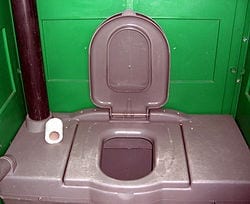The City of Cape Town’s has been found guilty of infringing on people’s human rights. It was found that the roll out of chemical toilets unfairly discriminates against “black African” people, and violates the rights to basic sanitation and dignity of informal settlement residents.
In light of these and other damning findings, the HRC recommends that the City develop comprehensive new sanitation norms and standards – ones that are based on human rights principles and that take the lived reality of persons receiving the services into account. The HRC report revealed that the City has, up until now, “unreasonably” used “emergency housing” guidelines to inform the provision of sanitation in informal settlements, as well as a one-size-fits-all approach in servicing the chemical toilets. It also found that the City does not adequately consult with the communities that they service. As such, the City should take “significant measures” to reinforce community engagement in sanitation tender processes.The recommendations conclude a year long investigation into the state of sanitation services provided by City contractor Mshengu in informal settlements. In June 2013, the Social Justice Coalition (SJC) approached the HRC, alleging that the City had violated the rights to equality, dignity, privacy, basic sanitation and a healthy environment of residents in four informal settlements.
This was the SJC’s conclusion after a week-long social audit of the services in four areas of Khayelitsha, in April 2013. The audit surveyed the condition of 256 chemical toilets and spoke to residents about their experience of the service. Half of the toilets were found to be damaged, inaccessible or in a state of “extreme uncleanliness”. Residents reported that around a third of the toilets had not been emptied in the week prior to the audit. Axolile Notywala, SJC spokesman, today hailed the HRC report as a “victory in the struggle for dignity and equality by people living in informal settlements throughout South Africa.” He vowed that the SJC would continue to lobby and put pressure on the City, and “all levels of government”, to implement the recommendations. The report also recommends that the newly formed national Ministry of Water and Sanitation provides training and materials to assist municipalities throughout the country to devise better norms and standards. This brings wide reaching national relevance to the report.






